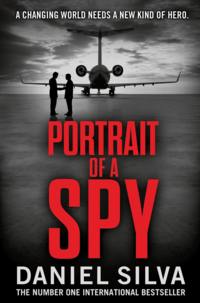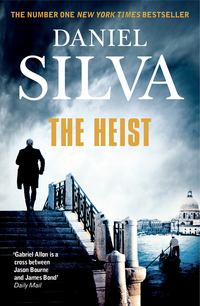
Полная версия
The Black Widow
“I guess ISIS isn’t the jayvee team after all.”
“To that end,” Rousseau continued, “the Agency is expecting full and complete cooperation from America’s friends and partners here in Europe. The man from Langley is due in Paris tomorrow morning.”
“It might be wise for you to spend some time with him.”
“My name is already on the guest list.”
Gabriel handed Rousseau a slip of paper, folded in quarters.
“What’s this?”
“A list of additional files we need.”
“How much longer?”
“Soon,” said Gabriel.
“That’s what you said yesterday, and the day before.” Rousseau slipped the list into the breast pocket of his tweed jacket. “Are you ever going to tell me where you and your helpers are working?”
“You mean you haven’t figured it out yet?”
“We haven’t tried.”
“Somehow,” said Gabriel, “I find that difficult to believe.”
He rose without another word and went into the street. Rousseau watched him walk away along the darkened pavement, followed discreetly by two of Alpha Group’s best surveillance men. The little bald man with the lavender necktie laid a few bills on his table and departed, leaving Rousseau alone in the brasserie with no company other than his mobile phone. Five minutes elapsed before it finally illuminated. It was a text message from Christian Bouchard. “Merde,” said Rousseau softly. Allon had lost them again.
12
PARIS
IT WAS WITH A PAIR of routine countersurveillance moves—a reversal of course along a one-way street, a brief stop in a bistro that had a rear service exit off the kitchen—that Gabriel slipped away from the finest watchers of Paul Rousseau’s Alpha Group. Afterward, he made his way, on foot, by Métro, and in a taxi, to a small apartment building along the edge of the Bois de Boulogne. According to the intercom panel, the occupant of 4B was someone named Guzman. Gabriel thumbed the button, waited for the snap of the automatic locks, and entered.
Upstairs, Mikhail Abramov unchained the door to him. The air was bitter with smoke. Gabriel peered into the kitchen and saw Eli Lavon attempting to extinguish a fire he had started in the microwave. Lavon was a diminutive figure, with a head of wispy unkempt hair and a face that was entirely forgettable. His looks, like most things about him, were deceiving. A natural predator and chameleon, Lavon was regarded as the finest street surveillance artist the Office ever produced. Ari Shamron had famously said of Lavon that he could disappear while shaking your hand. It wasn’t far from the truth.
“How long did it take you to lose them this time?” Lavon asked as he tossed a misshapen lump of charred plastic into the sink.
“Less time than it took you to burn down the safe flat.”
“A small mix-up with the time setting. You know me, I’ve never really been good with numbers.”
Which wasn’t true. Lavon also happened to be a skilled financial investigator who singlehandedly had managed to track down millions of dollars’ worth of looted Holocaust assets. An archaeologist by training, he was a natural digger.
Gabriel entered the sitting room. Yaakov Rossman, a veteran agent runner and a fluent speaker of Arabic, appeared to be contemplating an act of violence against his notebook computer. Yossi Gavish and Rimona Stern were sprawled on the couch like a couple of undergraduates. Yossi was a top officer in Research, which is how the Office referred to its analytical division. Tall, tweedy, and balding, he had read classics at All Souls and spoke Hebrew with a pronounced English accent. He had also done a bit of acting—Shakespearean, mainly—and was a gifted cellist. Rimona served in the Office unit that spied on Iran’s nuclear program. She had sandstone-colored hair, childbearing hips, and a temper she had inherited from Ari Shamron, who was her uncle. Gabriel had known her since she was a small child. Indeed, his fondest memories of Rimona were of a fearless young girl on a kick scooter careening down the steep drive of her famous uncle’s house.
The five field agents and analysts were members of an elite team of operatives known as Barak, the Hebrew word for lightning, for their ability to gather and strike quickly. They had fought and sometimes bled together on a string of secret battlefields stretching from Moscow to the Caribbean, and in the process had carried out some of the most fabled operations in the history of Israeli intelligence. Gabriel was the team’s founder and leader, but a sixth member, Dina Sarid, was its conscience and institutional memory. Dina was the Office’s top terrorism specialist, a human database who could recite the time, place, perpetrators, and casualty toll of every act of Palestinian or Islamic terrorism committed against Israel and the West. Her talent was to see connections where others saw only a blizzard of names, numbers, and words.
She was small in stature, with coal-black hair that fell about a soft, childlike face. At present, she was standing before a seemingly haphazard collage of surveillance photos, e-mails, text messages, and phone conversations. It was the same place she had been standing, three hours earlier, when Gabriel had left the safe flat for his meeting with Paul Rousseau. Dina was in the grip of the fever, the frightful creative rage that came over her each time a bomb exploded. Gabriel had induced the fever many times before. Judging by her expression, it was about to break. He crossed the room and stood beside her.
“What are you looking at?” he asked after a moment.
Dina took two steps forward, limping slightly, and pointed toward a surveillance photo of Safia Bourihane. It had been taken before her first trip to Syria, in an Arab-style café in the heavily immigrant Paris banlieue of Saint-Denis. Safia had recently taken the veil. Her companion, a young woman, was veiled, too. There were several other women in the café, along with four men, Algerians, Moroccans, sharing a table near the counter. Another man, angular face, clean-shaven, slightly out of focus, sat alone. He wore a dark business suit, no tie, and was working on a notebook computer. He might have been an Arab—or he might have been a Frenchman or an Italian. For the moment he was of no concern to Dina Sarid. She was gazing, spellbound, at the face of Safia Bourihane.
“She looks normal, doesn’t she? Happy, even. You’d never suspect she’d spent the entire morning talking to an ISIS recruiter on the Internet. The recruiter asked her to leave her family and travel to Syria to help build the caliphate. And what do you suppose Safia told him?”
“She said she wanted to stay in France. She said she wanted to marry a nice boy from a good family and have children who would grow up to be fully assimilated French citizens. She said she wanted no part of a caliphate run by men who behead and crucify and burn their enemies alive.”
“Isn’t it pretty to think so.” Dina shook her head slowly. “What went wrong, Gabriel? Why have more than five hundred young Western women joined the ranks of ISIS? Why are the bearded ones the new rock stars of Islam? Why are killers cool?” Dina had devoted her life to the study of terrorism and Islamic extremism, and yet she had no answers. “We thought they would be repulsed by the violence of ISIS. We were wrong. We assumed assimilation was the answer. But the more they assimilated, the less they liked what they saw. And so when a recruiter from ISIS comes knocking on their digital door, they’re vulnerable.”
“You’re too charitable, Dina.”
“They’re children.” She paused, then added, “Impressionable girls.”
“Not all of them.”
“That’s true. Many are educated, much more educated than the men who’ve joined ISIS. They’re forbidden to fight, the women, so they take on important support roles. In many respects, it’s the women who are actually building the caliphate. Most of them will also take a husband—a husband who’s likely to soon be a martyr. One in four women will become widows. Black widows,” she added. “Indoctrinated, embittered, vengeful. And all it takes is a good recruiter or talent spotter to turn them into ticking time bombs.” She pointed toward the slightly-out-of-focus figure seated alone in the Arab-style café. “Like him. Unfortunately, the French never noticed him. They were too busy looking at Safia’s friend.”
“Who is she?”
“She’s a girl who watched a few beheading videos on the Internet. She’s a waste of time, money, and manpower. But not Safia. Safia was trouble waiting to happen.” Dina took a step to the right and indicated a second photograph. “Three days after Safia had coffee with her friend in Saint-Denis, she came to the center of Paris to do a bit of shopping. This picture was taken as she was walking along the arcades of the rue de Rivoli. And look who’s walking a few steps behind her.”
It was the same man from the café, the clean-shaven man with an angular face who might have been an Arab or a Frenchman or an Italian.
“How did they miss him?”
“Good question. And they missed him here, too.”
Dina pointed toward a third photograph, the same day, an hour later. Safia Bourihane was leaving a women’s clothing store on the Champs-Élysées. The same man was waiting outside on the pavement, pretending to consult a tourist guidebook.
“Send the photos to King Saul Boulevard,” said Gabriel. “See if anything turns up.”
“I already have.”
“And?”
“King Saul Boulevard has never made his acquaintance.”
“Maybe this will help.” Gabriel held up the flash drive.
“What is it?”
“The life and times of Margreet Janssen.”
“I wonder how long it will take to find Safia’s secret admirer.”
“I’d hurry if I were you. The Americans have her file, too.”
“I’ll beat them,” she said. “I always do.”

It took Dina fewer than thirty minutes to find the first surveillance photograph of Margreet Janssen and the man who had shadowed Safia Bourihane in Paris. An AIVD team had snapped the picture at a quaint Italian restaurant in central Amsterdam where Margreet, having left her dreary home in Noordwijk, was waiting tables for starvation wages. It wasn’t difficult to spot him; he was dining alone with a volume of Sartre for protection. This time, the camera managed to capture him in focus, though he was somewhat different in appearance. A pair of round eyeglasses had softened the sharp edges of his face; a cardigan sweater lent him a librarian’s unthreatening air. Margreet was his server, and judging from her wide smile she found him attractive—so attractive, in fact, that she agreed to meet him for drinks later at a bar on the edge of the red-light district. The evening ended with a well-executed slap, delivered with Margreet’s right hand to the man’s left cheek and witnessed by the same surveillance team. It was, thought Gabriel, a nice touch of tradecraft. The Dutch wrote the man off as a cad and never tried to establish his identity.
But what was the connection between the two women, other than the man who might have been an Arab or a Frenchman or an Italian? Dina found that, too. It was a Web site based in the Persian Gulf emirate of Qatar that sold clothing for Muslim women of piety and taste. Safia Bourihane had surfed it three weeks before the man’s visit to Paris. Margreet Janssen had stopped there just ten days before the slap in Amsterdam. Dina suspected that the site contained a password-protected room where ISIS recruiters could invite promising young women for a private chat. These encrypted rooms had so far proved almost impenetrable to the intelligence services of Israel and the West. Even the mighty National Security Agency, America’s omniscient signals intelligence service, was struggling to keep pace with ISIS’s digital hydra.
There is no worse feeling for a professional spy than to be told something by an officer from another service that he should have already known himself. Paul Rousseau endured this indignity in a small café on the rue Cler, a fashionable pedestrian shopping street not far from the Eiffel Tower. The French police had erected barricades at the intersections of the cross streets and were checking the handbags and backpacks of everyone who dared to enter. Even Gabriel, who had nothing in his possession other than a manila envelope filled with photographs, was thoroughly searched before being allowed to pass.
“If this were ever to become public,” said Rousseau, “it would be deeply embarrassing for my service. Heads would roll. Remember, this is France.”
“Don’t worry, Paul, your secret is safe with me.”
Rousseau leafed again through the photos of Safia Bourihane and the man who for two days had followed her around Paris undetected by the DGSI.
“What do you suppose he was doing?”
“Watching her, of course.”
“Why?”
“To make sure she was the right kind of girl. The question is,” said Gabriel, “can you find him?”
“These photographs were taken more than a year ago.”
“Yes?” asked Gabriel leadingly.
“It will be difficult. After all,” said Rousseau, “we still haven’t been able to find out where your team is working.”
“That’s because we’re better than he is.”
“Actually, his track record is rather good, too.”
“He didn’t travel to the café in Saint-Denis on a magic carpet,” said Gabriel. “He took a train, or a bus, or he walked along a street with security cameras.”
“Our network of CCTV cameras is nowhere near as extensive as yours or the British.”
“But it exists, especially in a place like Saint-Denis.”
“Yes,” said Rousseau. “It exists.”
“So find out how he got there. And then find out who he is. But whatever you do,” Gabriel added, “do it quietly. And don’t mention any of this to our friend from Langley.”
Rousseau consulted his wristwatch.
“What time are you seeing him?”
“Eleven. His name is Taylor, by the way. Kyle Taylor. He’s the chief of the CIA’s Counterterrorism Center. Apparently, Monsieur Taylor is very ambitious. He’s droned many terrorists. One more scalp, and he might be the next director of operations. At least, that’s the rumor.”
“That would come as news to the current director.”
“Adrian Carter?”
Gabriel nodded.
“I’ve always liked Adrian,” said Rousseau. “He’s a decent soul, and rather too honest for a spy. One wonders how a man like that could survive so long in a place like Langley.”

As it turned out, it took Rousseau’s Alpha Group just forty-eight hours to determine that the man from the café in Saint-Denis had traveled to Paris from London aboard a Eurostar high-speed train. Surveillance photographs showed him disembarking at the Gare du Nord in late morning and boarding a Métro a few minutes later, bound for the northern suburbs of Paris. He departed Paris the morning after he was photographed on the rue de Rivoli and the Champs-Élysées, also aboard a Eurostar train, this one bound for London.
Unlike most international trains in Western Europe, the Eurostar requires passengers to clear passport control before boarding. Alpha Group quickly found their man in the manifests. He was Jalal Nasser, born in Amman, Jordan, in 1984, currently residing in the United Kingdom, address unknown. Rousseau dispatched a cable to MI5 in London and, in the dullest language possible, asked whether the British security service had a place of residence for one Jalal Nasser and whether it had reason to suspect his involvement in any form of Islamic extremism. His address arrived two hours later: 33 Chilton Street, Bethnal Green, East London. And, no, said MI5, it had no evidence to suggest that Nasser was anything more than what he claimed to be, which was a graduate student in economics at King’s College. He had been enrolled there, on and off, for seven years.
Gabriel dispatched Mikhail to London, along with a pair of all-purpose field hands named Mordecai and Oded, and within a few hours of their arrival they managed to acquire a small flat in Chilton Street. They also managed to snap a photograph of Jalal Nasser, the eternal student, walking along Bethnal Green Road with a book bag over one shoulder. It appeared on Gabriel’s mobile phone that evening as he was standing in the nursery of his apartment in Jerusalem, staring down at the two children sleeping peacefully in their cribs.
“They missed you terribly,” said Chiara. “But if you wake them …”
“What?”
She smiled, took him by the hand, and led him into their bedroom.
“Quietly,” she whispered as she loosened the buttons on her blouse. “Very quietly.”
13
AMMAN, JORDAN
EARLY THE FOLLOWING MORNING Gabriel slipped from the apartment while Chiara and the children were still sleeping and climbed into the back of his armored SUV. His motorcade contained two additional vehicles filled with well-armed Office security agents. And instead of heading west toward Tel Aviv and King Saul Boulevard, it skirted the gray Ottoman walls of the Old City and spilled down the slopes of the Judean Hills, into the unforgiving flatlands of the West Bank. Stars clung to the cloudless sky above Jerusalem, oblivious to the sun that lay low and fiery above the cleft of the Jordan Valley. A few miles before Jericho was the turnoff for the Allenby Bridge, the historic crossing between the West Bank and the British-created Hashemite Kingdom of Jordan. The ramp on the Israeli half had been cleared of traffic for Gabriel’s arrival; on the other side idled an impressive motorcade of Suburbans filled with mustachioed Bedouin soldiers. The head of Gabriel’s security detail exchanged a few words with his Jordanian counterpart. Then the two motorcades merged into one and set off across the desert toward Amman.
Their destination was the headquarters of Jordan’s General Intelligence Department, also known as the Mukhabarat, the Arabic word used to describe the all-pervasive secret services that safeguarded the fragile kingdoms, emirates, and republics of the Middle East. Surrounded by concentric rings of security men, a locked stainless steel attaché case in one hand, Gabriel strode swiftly across the marble lobby, up a flight of curved stairs, and into the office of Fareed Barakat, the GID’s chief. It was a vast room, four or five times the size of the director’s suite at King Saul Boulevard, and decorated with somber curtains, overstuffed chairs and couches, lustrous Persian carpets, and expensive trinkets that had been bestowed on Fareed by admiring spies and politicians around the world. It was the sort of place, thought Gabriel, where favors were dispensed, judgments were passed, and lives were destroyed. He had upgraded his usual attire for the occasion, exchanging his denim and leather for a trim gray suit and white shirt. Even so, his clothing paled in comparison to the worsted sartorial splendor that hung from the tall slender frame of Fareed Barakat. Fareed’s suits were handmade for him by Anthony Sinclair in London. Like the current king of Jordan, the man he was sworn to protect, he had been expensively educated in Britain. He spoke English like a news presenter from the BBC.
“Gabriel Allon, at long last.” Fareed’s small black eyes shone like polished onyx. His nose was like the beak of a bird of prey. “It’s good to finally meet you. After reading those stories about you in the newspaper, I was convinced I’d missed my chance.”
“Reporters,” said Gabriel disdainfully.
“Quite,” agreed Fareed. “Your first time in Jordan?”
“I’m afraid so.”
“No quiet visits to Amman on a borrowed passport? No operations against one of your many enemies?”
“I wouldn’t dream of it.”
“Wise man,” said Fareed, smiling. “Better to play by the rules. You’ll discover soon enough that I can be very helpful to you.”
Israel and Jordan had more in common than a border and a shared British colonial past. They were both westward-looking countries trying to survive in a Middle East that was spinning dangerously out of control. They had fought two wars, in 1948 and 1967, but had formally made peace in the afterglow of the Oslo peace process. Even before that, however, the Office and the GID had maintained close, if cautious, ties. Jordan was universally considered the most fragile of the Arab states, and it was the job of the GID to keep the king’s head on his shoulders and the chaos of the region at bay. Israel wanted the same thing, and in the GID had found a competent and reliable partner with whom they could do business. The GID was a bit more civilized than its brutal Iraqi and Egyptian counterparts, though no less ubiquitous. A vast network of informers watched over the Jordanian people and monitored their every word and deed. Even a stray unkind remark about the king or his family could result in a sojourn of indeterminate length in the GID’s labyrinth of secret detention centers.
Uzi Navot had warned Gabriel about the rituals that accompanied any visit to Fareed’s gilded lair: the endless cups of sticky-sweet Arab coffee, the cigarettes, the long stories of Fareed’s many conquests, both professional and romantic. Fareed always spoke as though he couldn’t quite believe his own luck, which added to his considerable charm. Where some men wearied under the burden of responsibility, Fareed thrived. He was the lord of a vast empire of secrets. He was a deeply contented man.
Throughout Fareed’s monologue, Gabriel managed to keep a placid, attentive smile fixed firmly on his face. He laughed when appropriate and posed a leading question or two, and yet all the while his thoughts wandered to the photographs contained in the locked stainless steel briefcase at his ankle. He had never carried a briefcase before—not willingly at least, only for the sake of his cover. It felt like a ball and chain, an anvil. He supposed he should find someone to carry it for him. But inwardly he feared that such a move might nurture in him a taste for privilege that would spiral, inevitably, to a valet, a food taster, and a standing appointment at an exclusive Tel Aviv hair salon. Already, he missed the small thrill of piloting his own automobile down the ski-slope grade of Highway 1. Fareed Barakat would surely have found such sentiments curious. It was said of Fareed that he once jailed his own butler for allowing the Earl Grey tea to steep a minute too long.
At length, Fareed brought the topic of conversation around to the situation at King Saul Boulevard. He had heard about Gabriel’s pending promotion, and Uzi Navot’s impending demise. He had also heard—from where he refused to say—that Gabriel intended to keep Navot around in some capacity. He thought this a very bad idea, horrendous actually, and told Gabriel so. “Better to sweep the decks and make a fresh start of it.” Gabriel smiled, praised Fareed for his shrewdness and wisdom, and said nothing more on the subject.
The Jordanian had also heard that Gabriel had recently become a father again. With the press of a button he summoned an aide, who entered the office bearing two gift-wrapped boxes, one enormous, the other quite small. Fareed insisted that Gabriel open both in his presence. The large box contained a motorized Mercedes toy car; the second box, the smaller, a strand of pearls.
“I hope you’re not offended because the car is German.”
“Not at all.”
“The pearls are from Mikimoto.”
“That’s good to know.” Gabriel closed the box. “I can’t possibly accept these.”
“You must. Otherwise, I’ll be deeply offended.”
Gabriel was suddenly sorry he had come to Amman without gifts of his own. But what was one supposed to give a man who jailed his butler for misbrewing a pot of tea? He had only the photographs, which he retrieved from the attaché case. The first showed a man walking along an East London street, a book bag over one shoulder, a man who might have been an Arab or a Frenchman or an Italian. Gabriel handed the photograph to Fareed Barakat, who gave it a brief glance. “Jalal Nasser,” he said, returning the photograph to Gabriel with a smile. “What took you so long, my friend?”






